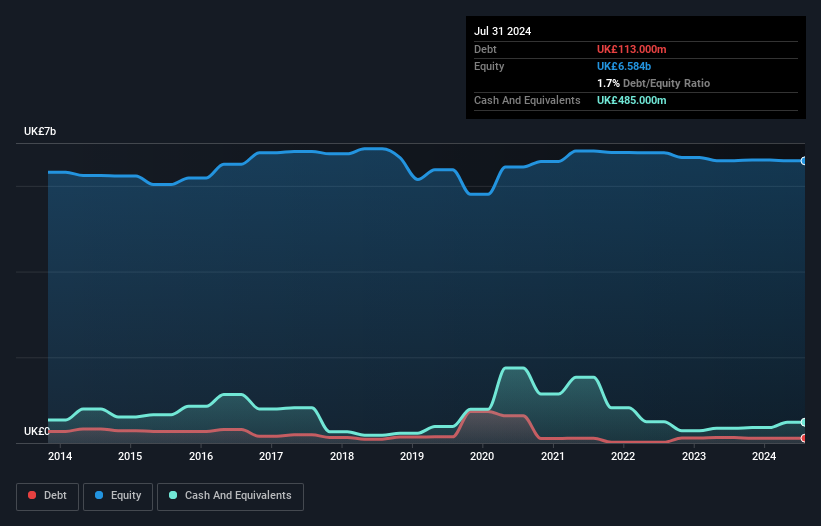
Legendary fund manager Li Lu (who Charlie Munger backed) once said, 'The biggest investment risk is not the volatility of prices, but whether you will suffer a permanent loss of capital.' When we think about how risky a company is, we always like to look at its use of debt, since debt overload can lead to ruin. We note that Kingfisher plc (LON:KGF) does have debt on its balance sheet. But is this debt a concern to shareholders?
When Is Debt A Problem?
Debt is a tool to help businesses grow, but if a business is incapable of paying off its lenders, then it exists at their mercy. In the worst case scenario, a company can go bankrupt if it cannot pay its creditors. However, a more usual (but still expensive) situation is where a company must dilute shareholders at a cheap share price simply to get debt under control. Of course, debt can be an important tool in businesses, particularly capital heavy businesses. When we think about a company's use of debt, we first look at cash and debt together.
See our latest analysis for Kingfisher
How Much Debt Does Kingfisher Carry?
The image below, which you can click on for greater detail, shows that Kingfisher had debt of UK£113.0m at the end of July 2024, a reduction from UK£129.0m over a year. But on the other hand it also has UK£485.0m in cash, leading to a UK£372.0m net cash position.

How Healthy Is Kingfisher's Balance Sheet?
According to the last reported balance sheet, Kingfisher had liabilities of UK£3.11b due within 12 months, and liabilities of UK£2.34b due beyond 12 months. Offsetting this, it had UK£485.0m in cash and UK£439.0m in receivables that were due within 12 months. So its liabilities total UK£4.52b more than the combination of its cash and short-term receivables.
This is a mountain of leverage relative to its market capitalization of UK£5.67b. Should its lenders demand that it shore up the balance sheet, shareholders would likely face severe dilution. While it does have liabilities worth noting, Kingfisher also has more cash than debt, so we're pretty confident it can manage its debt safely.
On the other hand, Kingfisher saw its EBIT drop by 6.3% in the last twelve months. If earnings continue to decline at that rate the company may have increasing difficulty managing its debt load. The balance sheet is clearly the area to focus on when you are analysing debt. But ultimately the future profitability of the business will decide if Kingfisher can strengthen its balance sheet over time. So if you want to see what the professionals think, you might find this free report on analyst profit forecasts to be interesting.
Finally, a company can only pay off debt with cold hard cash, not accounting profits. While Kingfisher has net cash on its balance sheet, it's still worth taking a look at its ability to convert earnings before interest and tax (EBIT) to free cash flow, to help us understand how quickly it is building (or eroding) that cash balance. During the last three years, Kingfisher generated free cash flow amounting to a very robust 83% of its EBIT, more than we'd expect. That positions it well to pay down debt if desirable to do so.
Summing Up
Although Kingfisher's balance sheet isn't particularly strong, due to the total liabilities, it is clearly positive to see that it has net cash of UK£372.0m. The cherry on top was that in converted 83% of that EBIT to free cash flow, bringing in UK£1.1b. So we are not troubled with Kingfisher's debt use. The balance sheet is clearly the area to focus on when you are analysing debt. However, not all investment risk resides within the balance sheet - far from it. Be aware that Kingfisher is showing 1 warning sign in our investment analysis , you should know about...
At the end of the day, it's often better to focus on companies that are free from net debt. You can access our special list of such companies (all with a track record of profit growth). It's free.
If you're looking to trade Kingfisher, open an account with the lowest-cost platform trusted by professionals, Interactive Brokers.
With clients in over 200 countries and territories, and access to 160 markets, IBKR lets you trade stocks, options, futures, forex, bonds and funds from a single integrated account.
Enjoy no hidden fees, no account minimums, and FX conversion rates as low as 0.03%, far better than what most brokers offer.
Sponsored ContentValuation is complex, but we're here to simplify it.
Discover if Kingfisher might be undervalued or overvalued with our detailed analysis, featuring fair value estimates, potential risks, dividends, insider trades, and its financial condition.
Access Free AnalysisHave feedback on this article? Concerned about the content? Get in touch with us directly. Alternatively, email editorial-team (at) simplywallst.com.
This article by Simply Wall St is general in nature. We provide commentary based on historical data and analyst forecasts only using an unbiased methodology and our articles are not intended to be financial advice. It does not constitute a recommendation to buy or sell any stock, and does not take account of your objectives, or your financial situation. We aim to bring you long-term focused analysis driven by fundamental data. Note that our analysis may not factor in the latest price-sensitive company announcements or qualitative material. Simply Wall St has no position in any stocks mentioned.
About LSE:KGF
Kingfisher
Supplies home improvement products and services in the United Kingdom, Ireland, France, Poland, and internationally.
Flawless balance sheet second-rate dividend payer.
Similar Companies
Market Insights
Community Narratives



